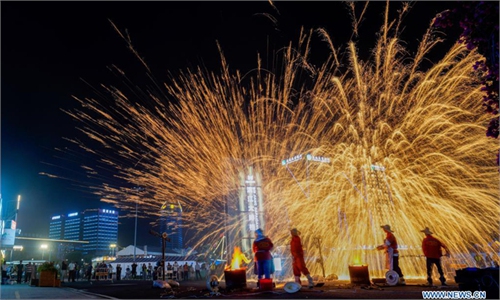Shanghai kicks off nightlife festival, showcasing vibrant metropolis and boosting nighttime economy

Two vendors put on a live-stream broadcast at Anyi Yexiang on Saturday in Shanghai. Photo: VCG
A nightlife festival kicked off this weekend in Shanghai with over 200 kinds of events covering shopping, entertainment shows and reading being held to showcase the vibrant and exciting city, in a latest move that brings efforts to boost the nighttime economy into full swing.
The festival will last until June 20, covering over 10 major nightlife commercial landmarks, mostly fashionable social and culture destinations such as Yu Garden Mall, Xintiandi and Sinan Mansions, where residents can enjoy a range of boutique stores, bookshops and cafes.
Over 30 museums will hold night activities for residents' enjoyment. Also, over 50 night fairs will light up the city with merchants selling small goods and delicious food and drinks. Bookstores including Shanghai Book City will launch 30 night reading activities. On Saturday alone, over 50 merchants extended their business hours to around 11 pm.
The Global Times reporter saw many residents, especially young people, most of whom were wearing masks, enjoying the city's nightlife. In Anyi Yexiang, a pedestrian night fair selling small commodities, food and drinks, young people were seen shuttling between vendors, checking out the food and goods on offer.
In a bookstore in Shanghai, a woman in her 40s surnamed Jin told the Global Times on Saturday that she wasn't worried about the COVID-19 epidemic, "It's a good place to take my son reading at night, which is fun and interesting."
The number of night trips being made in Shanghai continued to rise in 2020, with 923,600 more than in 2019, despite the epidemic. The average number of people traveling in Shanghai after 8 pm every day is about 4.21 million, accounting for 17.67 percent of the total number traveling throughout the day, ranking first in the country, according to a report released by yicai.com on Saturday.
In April 2019, Shanghai launched guidelines to boost the night economy, with supporting policies such as increasing the number of taxi stands and night bus lines in the surrounding areas of night commercial areas.
Due to the impact of the coronavirus, cities across the nation started to use nightlife as a way to boost the economy. In Southwest China's Chongqing, over 30,000 merchants participated in over 40 nightlife events in August 2020. In a report released by Trip in May, Chongqing, Changsha, capital city of Central China's Hunan Province, and Guangzhou in South China's Guangdong Province are among the top destinations for night tourism.
Notably, like Beijing and Shenzhen, Shanghai is also ramping up its launch of a digital yuan payment pilot program, which has covered some major commercial areas such as Nanjing Pedestrian Road Mall near the Bund. The Global Times noticed that some shopping malls put up notices at checkout counters reminding consumers they can pay via digital yuan.
The city is also holding a lottery that gives residents the chance to win 350,000 "red packets", each containing 55 yuan ($8.6) worth of digital yuan, as a way to accelerate the adoption of e-currency payment. Residents can use it between June 11 and June 20.



